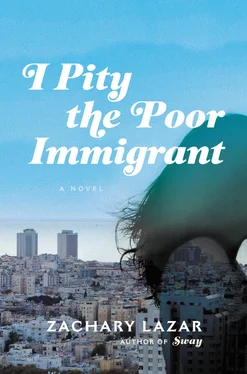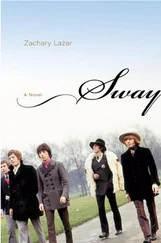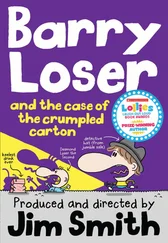I asked the question I shouldn’t have asked, and Voss said yes, he had killed someone, he had been in a war. When I asked him to tell me the circumstances, he shook his head.
“I don’t talk about that,” he said. “Why would you want to talk about it?”
“Eliav Bellen said that his father thought everything was doomed. I wonder what you think about that.”
“Eliav was talking about himself. Not his father.”
“I’m asking about you.”
“David Bellen didn’t write poems because he thought everything was doomed.”
“And what about you?”
“I live here. I don’t think everything is doomed either.”
We asked our waiter if he had ever heard of David Bellen. The waiter told us yes, David Bellen had eaten here every few weeks right up to his death.
“He liked to have lunch here and then he would walk around the neighborhood, the market,” he said. “Most people didn’t know who he was. He was very quiet, almost invisible. He didn’t want us to put his picture on the wall.”
19) A SUICIDE
Voss had brought a small suitcase this time with a few changes of clothes. We went swimming in the Mediterranean and then sat beneath an orange umbrella on rented chairs and I drank a Gold Star beer and Voss drank a club soda with a certain amount of rue. He told me about an Arab friend he’d had during his twenties when he’d lived here in Tel Aviv. It was after the war, and he and the friend had shared a bright cynicism toward anything more serious than what we saw before us now — people swimming, people laughing and smoking and having picnics on the sand. Lots of drinking, lots of drugs, lots of girls. The friend owned horses now, which he kept stabled in the Galilee. He drove a cab and had a wife and three kids, and he and his brother bred Arabian stallions for the track. He and Voss both lived in Jerusalem now, but they never saw each other. They hadn’t spoken in years. It was not because of politics, but because “Ali is still married and I’m not.”
I told Voss a story about an Arab cabdriver I’d had on my way from Jerusalem to Tel Aviv. On the way is a town called Abu Ghosh which is famous for its hummus. I asked the driver about why the hummus was so famous and he looked at me in silence. It turned out that he thought I was asking about Hamas, not hummus. Eventually we laughed. Voss laughed a little when I told him this story. We went back in the water and I thought everything between us was fine. He put his hands on my hips and I floated.
In my room, I had drawn the sheer curtain which let some sunlight come in — the other choice was total darkness. I don’t talk about that. Why would you want to talk about it? The room was beige and clean and smelled like the salt water on our towels. Voss couldn’t concentrate. I tried to help him. It was when I moved down his stomach that it happened. It happened so quickly that I thought something had been shot through the window.
I lay with my hand pressed to the side of my mouth, my lip and the inside of my cheek bleeding. My jaw rang. I don’t think Voss knew what he’d done. He turned on his side and grasped both my wrists in his hands. “Bad luck,” he said. “You can put this in the piece too.” He was holding my wrists very tightly, a blank anger in his eyes, which seemed unseeing. I don’t know why, but I thought of the Church of the Nativity in Bethlehem. We had driven there, I and the tourists and the driver with the cell phone that played “Careless Whisper.” It was a dim place hung with censers and shabby brass lamps. I waited in line to see the manger, but the crowd was so thick that I hardly bothered to crouch down and peer into what was nothing more than a little shelf in the stone.
He brought his hand to my face and wiped my lip and I didn’t know if he was going to hit me again or not. I could see that he didn’t know either.
20) KILLING TIME
I went for a long walk up Rothschild Boulevard the next morning, then I took a taxi back to Jerusalem. I had two days left before my flight home. The driver wondered why I had never been to Israel before. He asked if I’d been to Yad Vashem, the Holocaust memorial, and when I told him no he insisted that I should see it. Perhaps the reason I have never wanted to face too directly the idea of myself as a Jew is that all roads seem to lead to the Holocaust memorial, as if it is the Holocaust that makes one a Jew. I knew I would not be seeing Voss here again. Perhaps that’s why I ended up going to Yad Vashem that day.
Adolf Eichmann remembers: The truck was making for an open ditch, the doors were opened, and the corpses were thrown out, as though they were still alive, so smooth were their limbs. They were hurled into the ditch, and I can still see a civilian extracting the teeth with tooth pliers.
The tooth pliers bring it into focus. At Yad Vashem, what brought it into focus was a chart displaying locks of human hair. They illustrated the decadence in color gradations from Aryan gold to Semitic brown. I watched a video of Hitler giving a speech to a hall full of adulators. I watched a video of limp corpses being bulldozed into a trench. Black walls enclosed everything at harsh diagonals. I thought, this place has to exist but I don’t know what good it can possibly do. I went into a circular room with hundreds of black phone books full of names of the dead. A girl tourist walked around in a wet-eyed angry daze. I don’t cry very much. I cried when I saw her.
21) ECSTASY
There is a strange scene in the Bible when Saul, David’s predecessor as king, is pursuing David through the wilderness, trying to kill him. Saul learns that David is in a village called Naioth with the prophet Samuel. “And Saul sent messengers to take David, and they saw a band of prophets in ecstasy with Samuel standing poised over them, and the spirit of God came upon Saul’s messengers and they, too, went into ecstasy.” Saul dispatches more messengers, and they go into ecstasy. A third band is sent and they also go into ecstasy. It is unclear what it means to be “in ecstasy.” Finally Saul himself goes to Naioth and he “walked along speaking in ecstasy… and he, too, stripped off his clothes, and he, too, went into ecstasy before Samuel and lay naked all that day and all that night.”
In one of Ivan Schwebel’s paintings, David is dancing on a railway platform where cars are being loaded for transport to Auschwitz. He is naked, dancing in ecstasy. I wish I could talk to Voss about this. I would have liked to tell him that I think one of the points of Bellen’s book is that David was Yehezkel Aslan and he was Tony Montana, but he was also “one who wrestles with God.” To be that alive is to consume everything, even Auschwitz, and it is also to send for Bathsheba, simply because you can. Three thousand years ago, David, according to the tradition, was the poet who wrote the Psalms. Even if you can’t believe that someone named David literally wrote the Psalms, the fact is that someone wrote them. I wonder if anyone in the world now is writing words of such resonance.
22) NOT THAT KIND OF PIECE
… by returning to that neighborhood, Bellen was offering himself up. He thought he could escape and be a prize-winning poet and this would somehow change things, but of course it didn’t. It didn’t change anything, so he came back in defeat. Drawn back to the place that never cared if he escaped or not. He arranges a deal — his letters and papers, worth more when he’s dead, sold through someone who could get their full worth, someone from his old neighborhood. Proceeds will go to the useless son. The son has no idea about any of this. Any number of scenarios after that. Maybe Bellen’s broker/collaborator is so disgusted by the idea of Bellen contemplating all this that he kills Bellen himself, just because he can. Maybe that was somehow implied in their conversation all along. Maybe Bellen killed himself. Maybe they drove him to Beit Sahour and let him blow his own brains out behind a construction site. Maybe they let him do it in Tel Aviv. The people I’m talking about can arrange these things anywhere. They hate the Arabs but they also work with the Arabs. Was it Bellen’s inspiration or theirs to dump the body in Beit Sahour?
Читать дальше












